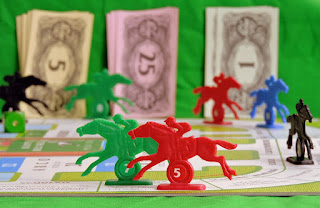Patrick Veitch is a name associated with gambling.
In fact, he is one of the most famous professional gamblers in the UK. Or at least he was. I'm not so sure if he bets in the style of old which he detailed in his fascinating book - Enemy Number One: Secrets of the UK's Most Feared Professional Punter.
Published back in 2010 by Highdown.
I've read the book and it is worthy of your time. Sure, like all punters, they talk a little too much about their unending wins and few losses but there's a lot of insight to be gained from Veitch's professional approach to gambling. He is reputed to have won £10M. The book covers a period of 9 years where he recorded his bets. It made me smile that he had about 10 phones to contact his army of agents to get his bets on which saw very large wagers and ultimately big wins. His story isn't one without problems. In fact, an introduction of a friend to a nasty piece of work would see him fear for his life and become something of a man of the run.
As seen with many professional gamblers, he was a maths prodigy and was actually accepted at Cambridge University at the age of 15. In fact, while studying at Trinity College he started his premium-rate telephone tipping service. Funnily enough, and I don't think many people have this record, I was searching through old Sporting Life - Weekender Publication and see one of this adverts on the front page. The photos attached is actually taken from the said copy which dates Wednesday May 11 - Saturday May 14th, 1994 (£1.35).
I'm pretty sure this is his actual advert on the front page of The Sporting life Weekender. I
guess it cost a good few quid to have it centre stage although you see there are two other adverts from 'Top Horse' and '2-Y-O Gamble'. The world and his wife love UK free bets.
Veitch detailed that he made £10,000 from his tips and dropped out of the world of academia to follow his passion. He went under the name 'The Professional' and A/B Rated advices are expected this with very strong news already received for York (Wed/Thurs) and also for Newbury (Fri/Sat).
Please don't phone the mainline now!
I remember buying the Weekender as my brother's research was published in Nick Mordin's Systems, which were very popular. You can see the post, below, which is very much a blast from the past. My brother, Tony, had a couple of conversations on the phone with Mordin. It was a very insightful piece of research which has carried on to this day within our interest in two-year-old horse racing and knowing the best juveniles in training. As Mordin's title said 'In a class of their own: How to spot and back potential top-notch two-year-olds. It's a fascinating read and Mordin followed up the piece with further research of his own.
It was a sad day when Mordin seemed to disappear from public life. He wrote a number of fine books and put his money where his mouth was being a professional gambler for a short time although reverted back to writing as it was a soleless and anti-social endeavour and too much travel.
I've had a lot of people email and ask if I have Nick Mordin's contact details.
I don't.
Anyway, this post has been enjoyable, remembering the good old days. Who would have thought the world of gambling would be included in a paper about Nick Mordin, The Coote Boys and Patrick Veitch.
From the number of tipster ads in The Weekender, there wasn't any lack of punters who wanted an edge. Nothing much changes on that score.
Good luck to all.










